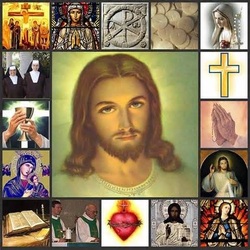
What is the Catholic Church All About?
History
Basic Doctrines
Code of Canon Law
Differences between Catholic and non-Catholic Christianity (see below)
History
Basic Doctrines
Code of Canon Law
Differences between Catholic and non-Catholic Christianity (see below)
Differences Between Catholic and Protestant Beliefs
|
Belief
Year Established Use of images (statues, pictures, icons) Concept of God Jesus Holy Texts: Referred to as Holy Scriptures , Bible, or Holy Bible. A collection of canonical books in two parts the Old Testament (OT) written before the birth of Christ and the New Testament (NT) written after the birth of Christ. Place and mode of worship Church Authority Means to Heaven (salvation)
|
CATHOLIC
33 A.D. The Catholic Church teaches that the "Church" as an organization was started at pentacost. Acts 2:1-4 Permitted as means of inspiration The Trinity of God; i.e. three divine persons in one God given the titles Father, Son, and Holy Spirit Jesus, the second person of the Trinity has always existed but at a point in history took on a human body to effect the redemption of mankind. His birth was through miraculous means via the Virgin Mary The official translation has been the Latin Vulgate since St. Jerome translated it in the the middle ages from older texts. The authorized English version in the U.S., used at mass, is the New American Bible (NAB). The Catholic Old Testament (OT) contains the seven books removed by Martin Luther which Catholics refer to as the deuterocanonical books. Church, chapel, cathedral. The "Holy Sacrifice of the Mass" is believed to be the re-presentation of the offering of Christ on the cross (i.e. not another sacrifice but the exact same sacrifice re-presented to the Church). Presided over by a priest who is a representative of the local Bishop. Pope is accepted as the Vicar of Christ as the successor to St. Peter who was the first Pope--although this term came into use later (see Mat. 16). He has authority in matters of faith and morals and appoints bishops; however, the individual bishops have a substantial amount of independence with regards to maintaining their diocese. Priests are answerable directly to their Bishop. more 1 2 3 Sacraments instituted by Jesus convey grace from God to the person receiving the sacrament. This is the "ordinary" means for obtaining grace established by God; however, God can act outside of the sacraments as he wills. Ordinarily necessary for salvation although God can act outside the sacrament of baptism. Validity requires water and the words "I baptize you in the name of the Father, the Son, and the Holy Spirit." see Mat 28:19 Although God can forgive sin without a priest, the ordinary means to gain forgiveness of serious sins is via sacramental confession to an ordained priest. see Jn 20:23 The ultimate effect of God's grace is to purify the soul-clean the soul-of all impurity and corruption in order that we may enter heaven "clean" and as a new creation in Christ. see Rev 21:27 |
Non-Catholic / Protestant*
Approx. 1540 A.D. beginning with Martin Luther; although different denominations came about at different dates. Generally not used. Some denominations even teach it is a sin to use images as devotionals Most non-Catholic traditions believe in the trinity. Two which don't are the Jehovah's Witnesses and the Mormons. Again, most traditions accept this understanding with the Jehovah's Witnesses and the Mormons being exceptions There is no common "official" bible translation between Protestant groups. However, many consider the King James Version (KJV) to be the most "authentic", and in some cases the only valid, translation. Martin Luther removed approximately seven books from the OT which is referred to as the apocrypha by many non catholics. The original KJV retained these books but the second KJV translation removed these books completely. Church or chapel (some denominations have cathedrals). Most denominations have as their main Sunday worship a talk from the pastor based on the topic of his choosing (usually from the bible): this can also involve prayer and singing. Some have a liturgical ceremony similar to the Catholic Church. None of the Protestant churches accept the authority of the Pope. Some of the older denominations have priests and bishops but most have a "pastor" who is answerable only to his own congregation and is appointed to his position by them. This can vary widely between denominations. By 'faith alone" is the most common way non-catholics say salvation is obtained. Beliefs vary from baptism being necessary for salvation to it being purely a symbol and not necessary at all. You go directly to God and ask forgiveness. Some denominations do not believe asking for forgiveness is necessary due to predestination; others believe repentance is necessary to receive forgiveness. Martin Luther taught God's grace covers us and hides the corruption of our souls like a blanked of snow on a dung heap; but underneath we remain corrupt. However, beliefs vary widely in Protestantism. |
*The term "Protestant" originally comes from the word "to protest," and many groups have dropped the original meaning and use it as a general term to describe Christians who are not Catholic, Orthodox, or belonging to one of the older (pre 1500s) churches. However, some groups do not like this term and prefer to simply be called "christian."
